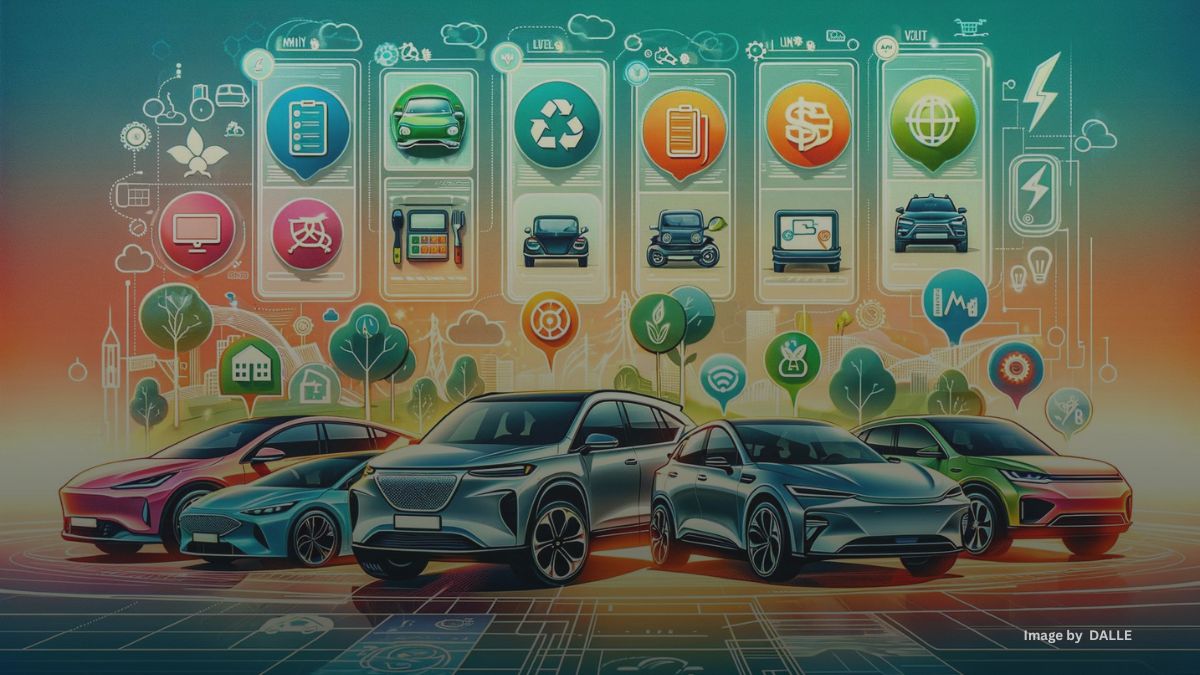Key Takeaway Box:
- Electric vehicles (EVs) are more environmentally friendly and cost-effective than gas-powered vehicles, but they come in different types and models that suit different needs and preferences.
- The main types of EVs are battery-electric vehicles (BEVs), plug-in hybrid vehicles (PHEVs), and hydrogen fuel cell vehicles (FCVs), each with its own advantages and disadvantages in terms of range, charging, performance, and availability.
- To choose the right EV for your lifestyle and budget, you should consider factors such as your driving habits, charging options, vehicle size, features, and price, as well as the incentives and rebates that may apply to your purchase or lease.
- You can use online tools and resources to compare different EVs and find the best one for you.

Introduction
Electric vehicles (EVs) are becoming more popular and accessible as more automakers offer a variety of models and options to meet the growing demand. EVs have many benefits over gas-powered vehicles, such as lower emissions, lower fuel and maintenance costs, and better performance. However, not all EVs are the same, and choosing the right one for your lifestyle and budget can be challenging. In this article, we will explain the different types of EVs, the factors you should consider when buying or leasing one, and the resources you can use to make an informed decision.
Types of EVs
There are three main types of EVs that you can choose from: battery-electric vehicles (BEVs), plug-in hybrid vehicles (PHEVs), and hydrogen fuel cell vehicles (FCVs). Each type has its own pros and cons, depending on your needs and preferences.
Battery-electric vehicles (BEVs)
BEVs are pure electric vehicles that run exclusively on electricity via onboard batteries that are charged by plugging into an outlet or charging station. Some examples of BEVs are the Tesla Model 3, the Nissan LEAF, and the Chevrolet Bolt.
The advantages of BEVs are:
- They have zero tailpipe emissions, which means they do not contribute to air pollution or greenhouse gas emissions.
- They have lower fuel and maintenance costs than gas-powered vehicles, as electricity is cheaper and more stable than gasoline, and BEVs have fewer moving parts that require servicing.
- They have better performance and handling than gas-powered vehicles, as they have instant torque, smooth acceleration, and regenerative braking.
The disadvantages of BEVs are:
- They have a limited range, which means they can only travel as far as their battery capacity allows. The average range of BEVs is about 250 miles, but it can vary depending on the model, driving conditions, and battery degradation.
- They have longer charging times than gas-powered vehicles, which means they need to be plugged in for hours to fully recharge. The average charging time of BEVs is about 8 hours using a Level 2 charger, but it can be reduced to 30 minutes using a fast charger.
- They have limited availability and variety, which means they are not widely available in every market and they do not offer as many models and options as gas-powered vehicles.
Plug-in hybrid vehicles (PHEVs)
PHEVs are similar to conventional hybrids in that they have both an electric motor and an internal combustion engine that runs on gas, but PHEVs have larger batteries that can be charged by plugging into an outlet or charging station. Some examples of PHEVs are the Toyota Prius Prime, the Ford Fusion Energi, and the Hyundai Ioniq Plug-in Hybrid.
IMPORTANT LINKS
- How to Trade in Your Old Gas-Powered Vehicle for an Electric Vehicle with the BC Scrap-It Program
- How to Get a Tax Write-Off for Your Business with the Federal Tax Incentive for Electric Vehicles
- How to Save Money with the Federal iZEV Program for Electric Vehicles
- How to Find the Best Electric Vehicle Charging or Hydrogen Refuelling Station Near You
- How to Buy or Lease a Heavy-Duty Electric Vehicle with the Federal iMHZEV Program
The advantages of PHEVs are:
- They have lower emissions than gas-powered vehicles, as they can run on electricity for a certain distance before switching to gas. The average electric range of PHEVs is about 30 miles, but it can vary depending on the model and driving conditions.
- They have lower fuel costs than gas-powered vehicles, as they can use electricity as their primary fuel source and gas as a backup. The average fuel economy of PHEVs is about 80 miles per gallon equivalent (MPGe), but it can vary depending on the model and driving mode.
- They have greater flexibility and convenience than BEVs, as they can travel longer distances without worrying about running out of battery or finding a charging station. They can also use the existing gas infrastructure and refuel in minutes.
The disadvantages of PHEVs are:
- They have higher emissions than BEVs, as they still rely on gas for part of their operation. They also have higher maintenance costs than BEVs, as they have more complex systems that require servicing.
- They have lower performance and efficiency than BEVs, as they have to carry the extra weight and space of the gas engine and the fuel tank. They also have less regenerative braking potential than BEVs, as they have to balance the power between the electric motor and the gas engine.
- They have higher upfront costs than gas-powered vehicles, as they have more expensive components and technology than conventional hybrids. They also have lower incentives and rebates than BEVs, as they are not considered as green as pure electric vehicles.
Hydrogen fuel cell vehicles (FCVs)
FCVs are different from other electric vehicles, as they use fuel cells that generate electricity through a chemical reaction between hydrogen and oxygen. They have an electric motor that drives the vehicle, but they do not have a battery or a plug. Some examples of FCVs are the Toyota Mirai, the Honda Clarity Fuel Cell, and the Hyundai Nexo.
The advantages of FCVs are:
- They have zero tailpipe emissions, as they only emit water vapor and heat as byproducts of the fuel cell reaction. They also have lower well-to-wheel emissions than gas-powered vehicles, as hydrogen can be produced from renewable sources such as solar, wind, and biomass.
- They have longer range and faster refueling than BEVs, as they can travel up to 400 miles on a single tank of hydrogen and refuel in minutes at a hydrogen station. They also have better performance and efficiency than gas-powered vehicles, as they have high power density and low heat loss.
- They have greater potential and innovation than other electric vehicles, as they are still in the early stages of development and improvement. They also have more support and collaboration from governments and industries, as they are seen as a key solution for the future of clean transportation.
The disadvantages of FCVs are:
- They have limited availability and infrastructure, as they are only sold in a few markets and there are very few hydrogen stations in the country. They also have high production and distribution costs, as hydrogen is difficult to store and transport.
- They have high upfront and operational costs, as they have expensive and complex components and technology. They also have lower incentives and rebates than other electric vehicles, as they are not widely recognized or promoted as green vehicles.
- They have safety and environmental concerns, as they involve high-pressure hydrogen tanks and flammable materials. They also have some greenhouse gas emissions from the production and delivery of hydrogen, depending on the source and method.
Factors to Consider When Buying or Leasing an EV
Now that you know the different types of EVs, you should consider some factors that will help you choose the right one for your lifestyle and budget. These factors include:
- Your driving habits: How often and how far do you drive? Do you mainly drive in the city or on the highway? Do you need to tow or haul anything? These questions will help you determine the range, performance, and size of the EV that you need. For example, if you drive a lot of miles every day, you may want a BEV or a PHEV with a long electric range and a fast charger. If you only drive occasionally or for short distances, you may be fine with a conventional hybrid or a PHEV with a small battery and a Level 2 charger. If you need a large or powerful vehicle, you may want to look for an electric SUV or truck, or a hybrid that can handle your needs.
- Your charging options: Where and how will you charge your EV? Do you have access to a garage or a parking spot with an outlet or a charging station? Do you have access to public or workplace charging? Do you live in an area with a good charging network? These questions will help you determine the type and level of charging that you need. For example, if you have a dedicated space where you can install a Level 2 charger at home, you may want a BEV or a PHEV that can take advantage of it. If you rely on public or workplace charging, you may want a BEV or a PHEV with a fast charger or a hybrid that does not need to be plugged in. If you live in an area with few or no charging options, you may want to wait until the infrastructure improves or consider a hybrid or a FCV that can use the existing gas or hydrogen network.
- Your vehicle size and features: What kind of vehicle do you prefer and what features do you need? Do you like a sedan, a hatchback, a crossover, or an SUV? Do you need a lot of space for passengers or cargo? Do you want a lot of technology and safety features? These questions will help you determine the style and comfort of the EV that you want. For example, if you like a sleek and sporty vehicle, you may want a BEV or a PHEV sedan or coupe with a lot of power and gadgets. If you need a spacious and practical vehicle, you may want a BEV or a PHEV or a hybrid crossover or SUV with a lot of space and features. If you want a futuristic and innovative vehicle, you may want a FCV sedan or SUV with a lot of technology and safety features.
- Your price and budget: How much are you willing to spend on your EV and how will you finance it? Do you want to buy or lease your EV? Do you qualify for any incentives or rebates that can lower your cost? These questions will help you determine the affordability and value of the EV that you want. For example, if you have a high budget and want to own your EV, you may want a BEV or a PHEV that has a high resale value and a long warranty. If you have a low budget and want to try out an EV, you may want to lease a BEV or a PHEV that has a low monthly payment and a short term. If you want to save money and get a good deal, you may want to look for a hybrid or a FCV that has a lot of incentives and rebates from the government and the manufacturer.
Resources to Compare and Find the Best EV for You
Once you have considered these factors, you may have a better idea of what type and model of EV you want. However, you may still want to compare different EVs and find the best one for you. Fortunately, there are many online tools and resources that can help you with that. Here are some examples:
- HustleHub: This is our website, where you can find a lot of information and tips about EVs, as well as reviews and ratings of different models and brands. You can also use our EV comparison tool to see how different EVs stack up against each other in terms of range, price, features, and more. You can also use our EV calculator to estimate your savings and costs of owning or leasing an EV, as well as your environmental impact. We also have a blog and a newsletter where we share the latest news and trends about EVs and the industry. We are here to help you find the best EV for your lifestyle and budget, and to join our community of Hustlers who are passionate about EVs and the environment.
- PlugStar: This is a website that helps you find the best EV for you based on your location, driving habits, and preferences. You can also find the best charging options for your EV, as well as the best incentives and rebates that apply to your purchase or lease. You can also get personalized advice and support from certified EV experts who can answer your questions and guide you through the process. PlugStar is a partner of the Electric Auto Association, a non-profit organization that promotes EV education and advocacy.
- FuelEconomy.gov: This is a website that provides official information and data about the fuel economy and emissions of different vehicles, including EVs. You can compare the MPG, MPGe, range, and annual fuel cost of different EVs, as well as the greenhouse gas and smog ratings. You can also find information about the federal tax credit and other incentives and laws that apply to EVs. FuelEconomy.gov is a service of the U.S. Department of Energy and the U.S. Environmental Protection Agency.
Conclusion
Choosing the right EV for your lifestyle and budget can be a rewarding and exciting experience, as you can enjoy the benefits of driving a cleaner, cheaper, and better vehicle. However, it can also be a daunting and confusing task, as you have to consider many factors and options that may affect your decision. By understanding the different types of EVs, the factors that you should consider, and the resources that you can use, you can make an informed and confident choice that suits your needs and preferences. We hope that this article has helped you learn how to choose the right EV for you, and that you will join us in the EV revolution.
Source: (1) Using the Zero-Emission Vehicle Planning and Charging Tool. https://www.energy.gov/femp/using-zero-emission-vehicle-planning-and-charging-tool. (2) Zev Rovine Selections – zrswines.com. https://zrswines.com/. (3) ZEV OZ9, P320, P365 Pistols – ZEV Technologies. https://www.zevtechnologies.com/Shop/Pistols. (4) Fleet Electrification Step 5: Identify ZEV Opportunities. https://www.energy.gov/femp/fleet-electrification-step-5-identify-zev-opportunities.















